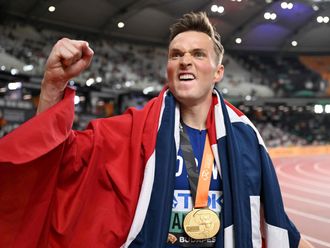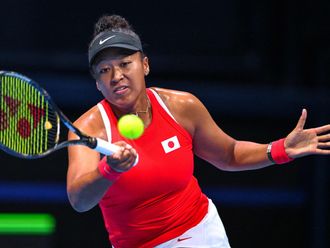Doha: Peter Sagan retained his world road race title in a tight sprint finish in Doha on Sunday, edging his British rival Mark Cavendish into second place.
The Slovakian, who also won in Richmond last year, said the result was “unbelievable”.
“I am still in total shock, I am very, very happy,” said the 26-year-old.
He is the first rider to retain the road race world title since Italy’s Paolo Bettini in Germany in 2007.
Sagan rode a masterful race throughout and was able to squeeze an opening as the sprinters bunched towards the finish line.
It caps a remarkable season for the Slovak who won the points classification at the Tour de France for the fifth consecutive year and the European Road Race championships only last month.
Many had predicted that the race, the final competition of the road world championships, would come down to a shootout between Sagan and Cavendish, and so it proved.
But the Briton, who won the event in 2011, appeared to be checked behind Australia’s Michael Matthews as he made his final push towards the line.
Belgium’s Tom Boonen finished third.
Fierce heat and sparse crowds, however, overshadowed the first world road race championships hosted in the Middle East. Races have been run in fierce temperatures regularly hitting 38 degrees Celsius (100 Fahrenheit).
“Organising a race here in October is perhaps not very wise,” said Belgium’s Olympic champion Greg Van Avermaet.
“The heat in Qatar is extreme,” added Dutch cyclist Roxane Knetemann.
“I cannot explain how excruciating it feels to be riding 40km through the desert. You’d expect organisers and the UCI to have some knowledge about cycling.”
Several riders, including Dutch Olympic silver-medallist Tom Dumoulin, have swallowed a small pill called an “E-celsius” before races, which allows their temperature to be measured.
The pill sends a signal to a receiver used by doctors so they can constantly monitor a rider’s temperature, says Sebastien Racinais, of the Doha-based Aspetar clinic which is providing medical staff for the championships.
Medics insisted no riders have suffered amid claims Dutch cyclist Anouska Koster crashed in the team time-trial due to heat exhaustion.
“It was not a problem of heat exhaustion, it was a problem of exhaustion performing a time trial,” said Dr Yorck Schumacher, also of the Aspetar clinic.
“She (Koster) confirmed that she is always like that in time trials. The heat in this championships should not be an issue.”
Schumacher said that other factors such as wind and humidity also have to be considered to calculate the full impact of conditions.
If done so, major tournaments such as the 2008 Beijing Olympics and the 2014 football World Cup in Brazil were tougher for competitors and players than this week in the Gulf, he said.
Schumacher estimates that “around 15-20 cyclists for any event” have used the tiny pill in Doha with the data to be examined later to see how competitors deal with the heat and recovery.











